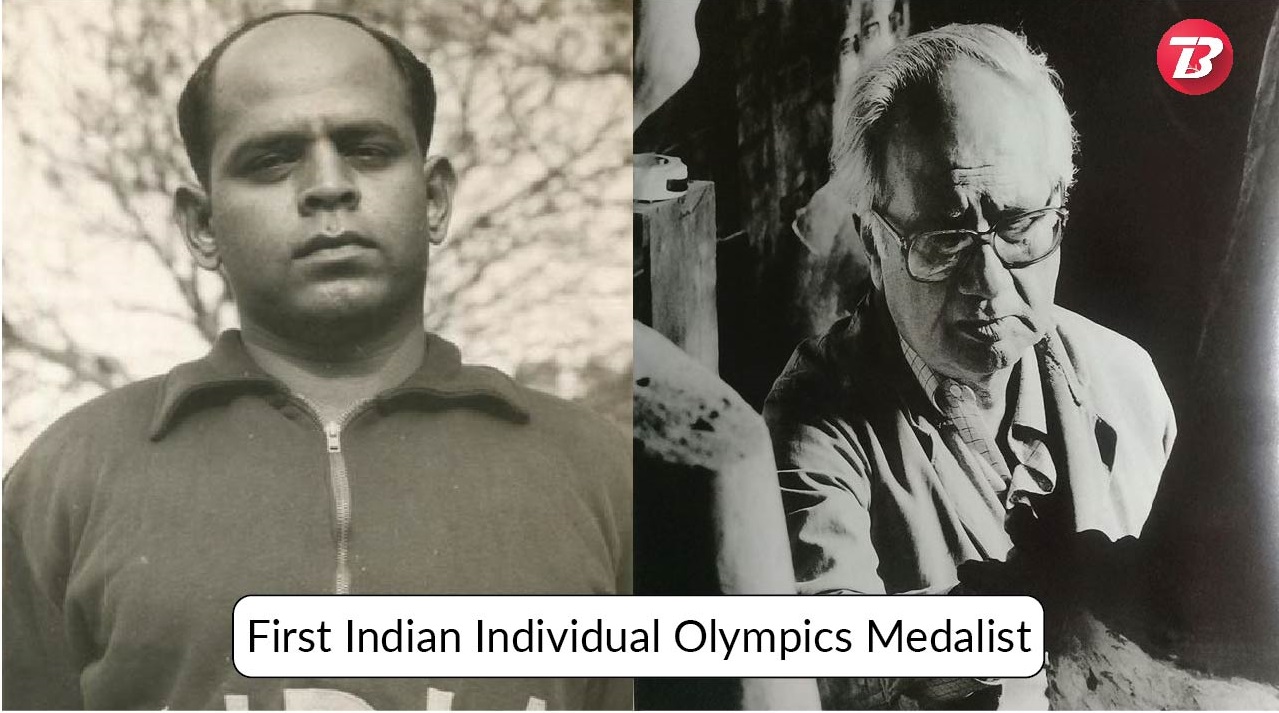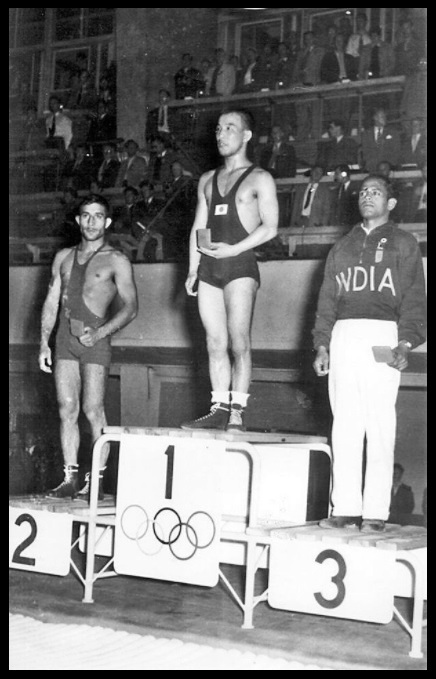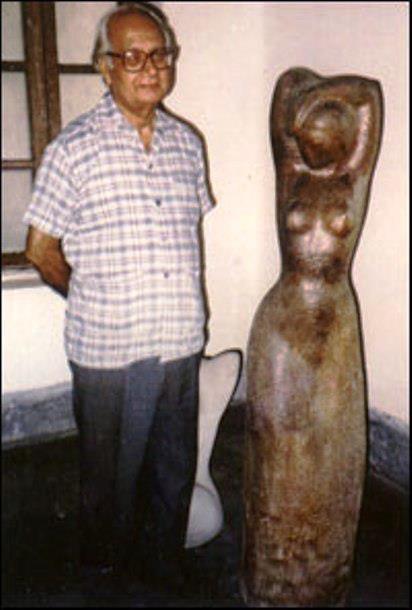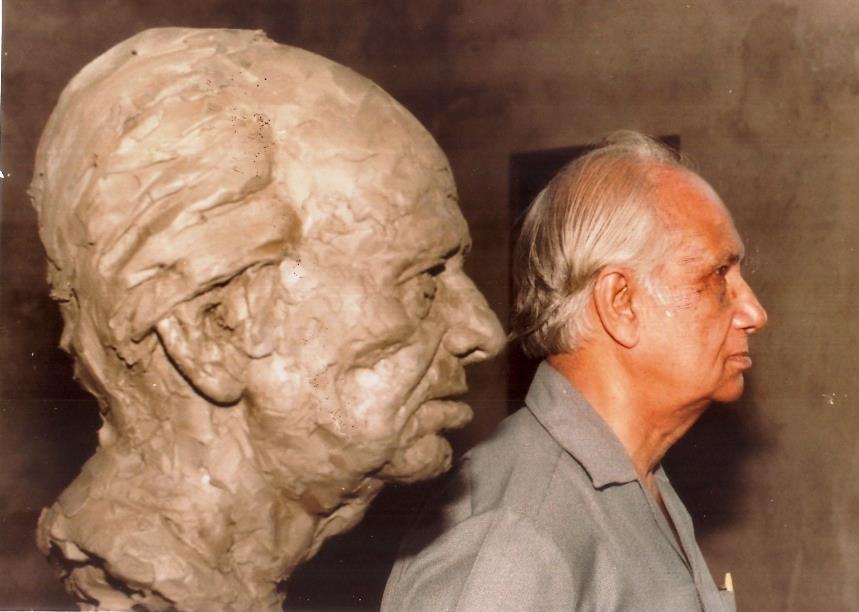Begin typing your search above and press return to search.
Featured
Not KD Jadhav, here’s the first Indian to win a medal in Olympics

In 1952, an Indian, for the first time won the individual Olympic medal for the country. It was wrestler Khashaba Dadasaheb Jadhav, who clinched the bronze medal in the freestyle 57 kg (bantamweight) category at the Helsinki Olympics. The Indian history has hardly paid homage to this legendary figure. But Jadhav wasn't the first Indian individual though to have a place on the Olympics podium. As surprising as it may sound, it is the Late Chintamoni Kar, who should be deemed with this historic feat achieved during the 1948 London Olympics.  K D Jadhav in podium 1952 Olympics The 1948 Games was a historic one, because it was the last time art competitions were a part of the Olympics. Many who associate the Games with athletes aren't aware that for its first four decades, the Olympics awarded official medals for painting, sculpture, architecture, literature and music, alongside those for the athletic competitions. The art competitions were part of the original intention of the Olympic Movement's founder, Pierre de Frédy and Baron de Coubertin. Between 1912 and 1948, 151 medals were awarded to original works in the fine arts inspired by athletic endeavours. Chintamoni Kar, who is revered as one of the most renowned artists of modern India, won a silver medal for his sculpture: Skating The Stag, while representing Great Britain in the 1948 Games.
K D Jadhav in podium 1952 Olympics The 1948 Games was a historic one, because it was the last time art competitions were a part of the Olympics. Many who associate the Games with athletes aren't aware that for its first four decades, the Olympics awarded official medals for painting, sculpture, architecture, literature and music, alongside those for the athletic competitions. The art competitions were part of the original intention of the Olympic Movement's founder, Pierre de Frédy and Baron de Coubertin. Between 1912 and 1948, 151 medals were awarded to original works in the fine arts inspired by athletic endeavours. Chintamoni Kar, who is revered as one of the most renowned artists of modern India, won a silver medal for his sculpture: Skating The Stag, while representing Great Britain in the 1948 Games.  Chintamoni Kar with his made sculpture Born in West Bengal's Kharagpur in 1915, Kar was trained at the Indian Society of Oriental Art run by Abanindranath Tagore. He learnt sculpting under the tutelage of Giridhari Mahapatra and Victor Giovanelli. In 1938 he moved to Paris to study at the Académie de la Grande. Kar came back to Kolkata and taught at the University of Calcutta and the Delhi Polytechnic. In 1946, he shifted to London and became a member of the Royal Society of British Sculptors. At the Summer Olympics in London in 1948, Kar was a participant for Great Britain and won the silver medal for his work. In 1956, he returned to West Bengal and was then elected as the Principal of the Government College of Art & Craft.
Chintamoni Kar with his made sculpture Born in West Bengal's Kharagpur in 1915, Kar was trained at the Indian Society of Oriental Art run by Abanindranath Tagore. He learnt sculpting under the tutelage of Giridhari Mahapatra and Victor Giovanelli. In 1938 he moved to Paris to study at the Académie de la Grande. Kar came back to Kolkata and taught at the University of Calcutta and the Delhi Polytechnic. In 1946, he shifted to London and became a member of the Royal Society of British Sculptors. At the Summer Olympics in London in 1948, Kar was a participant for Great Britain and won the silver medal for his work. In 1956, he returned to West Bengal and was then elected as the Principal of the Government College of Art & Craft.  Kar used a variety of elements including wood, terracotta, stone, and metal to sculpt and his work would be of abstract nature. He was honoured with the Padma Bhushan, the third highest Indian civilian award in 1974. He also received France’s highest civilian honour in 2000. The Chintamoni Kar Bird Sanctuary in West Bengal was named after the sculptor after he and other people from the local area fought for it to receive wildlife sanctuary status. Shortly before his death at the age of 90 in October 2005, Kar instituted the Bhaskar Bhavan Administration & Maintenance Trust at his residential campus in Narendrapur, Kolkata. In 2006, the campus became a public museum which houses the artist’s works as well as those of his wife. The trust holds the annual Chintamoni Kar Memorial lecture and aids poor students in the local area.
Kar used a variety of elements including wood, terracotta, stone, and metal to sculpt and his work would be of abstract nature. He was honoured with the Padma Bhushan, the third highest Indian civilian award in 1974. He also received France’s highest civilian honour in 2000. The Chintamoni Kar Bird Sanctuary in West Bengal was named after the sculptor after he and other people from the local area fought for it to receive wildlife sanctuary status. Shortly before his death at the age of 90 in October 2005, Kar instituted the Bhaskar Bhavan Administration & Maintenance Trust at his residential campus in Narendrapur, Kolkata. In 2006, the campus became a public museum which houses the artist’s works as well as those of his wife. The trust holds the annual Chintamoni Kar Memorial lecture and aids poor students in the local area.
 K D Jadhav in podium 1952 Olympics The 1948 Games was a historic one, because it was the last time art competitions were a part of the Olympics. Many who associate the Games with athletes aren't aware that for its first four decades, the Olympics awarded official medals for painting, sculpture, architecture, literature and music, alongside those for the athletic competitions. The art competitions were part of the original intention of the Olympic Movement's founder, Pierre de Frédy and Baron de Coubertin. Between 1912 and 1948, 151 medals were awarded to original works in the fine arts inspired by athletic endeavours. Chintamoni Kar, who is revered as one of the most renowned artists of modern India, won a silver medal for his sculpture: Skating The Stag, while representing Great Britain in the 1948 Games.
K D Jadhav in podium 1952 Olympics The 1948 Games was a historic one, because it was the last time art competitions were a part of the Olympics. Many who associate the Games with athletes aren't aware that for its first four decades, the Olympics awarded official medals for painting, sculpture, architecture, literature and music, alongside those for the athletic competitions. The art competitions were part of the original intention of the Olympic Movement's founder, Pierre de Frédy and Baron de Coubertin. Between 1912 and 1948, 151 medals were awarded to original works in the fine arts inspired by athletic endeavours. Chintamoni Kar, who is revered as one of the most renowned artists of modern India, won a silver medal for his sculpture: Skating The Stag, while representing Great Britain in the 1948 Games.  Chintamoni Kar with his made sculpture Born in West Bengal's Kharagpur in 1915, Kar was trained at the Indian Society of Oriental Art run by Abanindranath Tagore. He learnt sculpting under the tutelage of Giridhari Mahapatra and Victor Giovanelli. In 1938 he moved to Paris to study at the Académie de la Grande. Kar came back to Kolkata and taught at the University of Calcutta and the Delhi Polytechnic. In 1946, he shifted to London and became a member of the Royal Society of British Sculptors. At the Summer Olympics in London in 1948, Kar was a participant for Great Britain and won the silver medal for his work. In 1956, he returned to West Bengal and was then elected as the Principal of the Government College of Art & Craft.
Chintamoni Kar with his made sculpture Born in West Bengal's Kharagpur in 1915, Kar was trained at the Indian Society of Oriental Art run by Abanindranath Tagore. He learnt sculpting under the tutelage of Giridhari Mahapatra and Victor Giovanelli. In 1938 he moved to Paris to study at the Académie de la Grande. Kar came back to Kolkata and taught at the University of Calcutta and the Delhi Polytechnic. In 1946, he shifted to London and became a member of the Royal Society of British Sculptors. At the Summer Olympics in London in 1948, Kar was a participant for Great Britain and won the silver medal for his work. In 1956, he returned to West Bengal and was then elected as the Principal of the Government College of Art & Craft.  Kar used a variety of elements including wood, terracotta, stone, and metal to sculpt and his work would be of abstract nature. He was honoured with the Padma Bhushan, the third highest Indian civilian award in 1974. He also received France’s highest civilian honour in 2000. The Chintamoni Kar Bird Sanctuary in West Bengal was named after the sculptor after he and other people from the local area fought for it to receive wildlife sanctuary status. Shortly before his death at the age of 90 in October 2005, Kar instituted the Bhaskar Bhavan Administration & Maintenance Trust at his residential campus in Narendrapur, Kolkata. In 2006, the campus became a public museum which houses the artist’s works as well as those of his wife. The trust holds the annual Chintamoni Kar Memorial lecture and aids poor students in the local area.
Kar used a variety of elements including wood, terracotta, stone, and metal to sculpt and his work would be of abstract nature. He was honoured with the Padma Bhushan, the third highest Indian civilian award in 1974. He also received France’s highest civilian honour in 2000. The Chintamoni Kar Bird Sanctuary in West Bengal was named after the sculptor after he and other people from the local area fought for it to receive wildlife sanctuary status. Shortly before his death at the age of 90 in October 2005, Kar instituted the Bhaskar Bhavan Administration & Maintenance Trust at his residential campus in Narendrapur, Kolkata. In 2006, the campus became a public museum which houses the artist’s works as well as those of his wife. The trust holds the annual Chintamoni Kar Memorial lecture and aids poor students in the local area.Next Story






